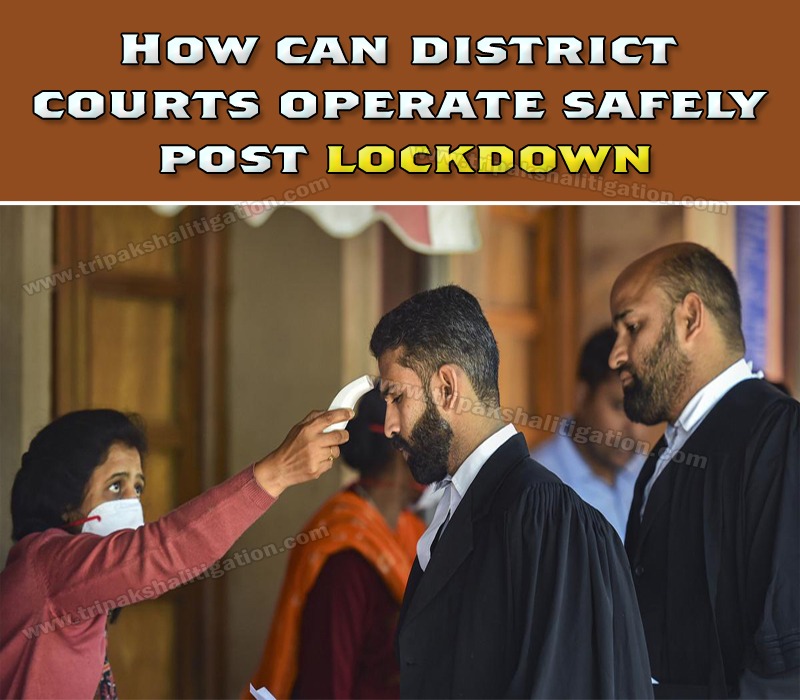The world is currently facing with its worst enemy, the novel corona virus. While all the countries and their health professional search for a cure, social distancing has turned out to be a temporary respite for the world and lock downs have been observed by many countries throughout the globe. The virus has taken 1,71,810 lives globally and approximately 20 lakh people still remain affected by the virus.
India, the world’s largest democracy does not remain untouched by the pandemic. The Indian government has also implemented a nationwide lockdown which was recently extended. The lockdown has affected people’s lives adversely. Many people have limited access to food and shelter and are forced to head to their hometowns in the tough times due to loss of livelihood.
The corollary of the pandemic can be felt in every sector in India and the same goes for the legal sector. The third pillar of democracy has come to a standstill with only the apex court functioning currently only to hear urgent matters. The lockdown may end sooner or later but the challenges for the Indian courts and judicial system will continue in the coming times. Hence there is a need for the courts in India especially for the lower courts to adapt themselves to the changing needs of the hour. The district/lower courts hold an important place in the judicial setup. District courts are the courts of first instance and therefore play an important role in the justice delivery system as the trial which includes stage of evidence takes place in these courts. Hence it is necessary that certain changes should be accommodated in such courts in order so that they justice can be delivered safely.
Some of the measures that can be adopted so that district courts operate safely post lock down are:
1. Video Conferencing
The Supreme Court has continued to work amid the lockdown and has been hearing urgent matters through video conferencing. The same procedure and technology can be adopted by the lower courts wherein the advocates can argue before the court virtually through video conferencing. This will ensure lesser crowding of courts and assist in swifter disposal of cases as an advocate can appear before the judge practically from anywhere. Similarly a Judicial officer can also operate the court from their chamber or from their house.
2. E-Filing
Proper mechanism should be set up and e-filing should be encouraged to ensure zero contact between the litigants, advocates, court staff and judicial officers. The case so filed could then be read on a computer screen or even a tablet. Supreme Court has adopted e-filing of urgent matters amid the lock down and the same could turn out to be very useful and efficient I lower courts as well. Not only would it ensure safety but it will also be more convenient and environment friendly.
3. E-Summoning
The courts have time and again stressed on the point that summoning can be done electronically either through Whatsapp or email. However physical summoning still remains the rule and e-summons are done as an exception. Courts should use electronic platform as a mode to serve summons and physical service of summons should be done exceptionally. This could possibly done by modernizing the hazarat branch in the courts and equipping them with necessary techs.
4. Minimal Gathering in Court Premises
The courts are in India are always open to the general public as India follows the principle of Public Hearing of cases. However in the times of pandemic physical public involvement has to be restricted. Before the lockdown came into force many courts throughout the country restricted public entry into the court premises. A system of pass entry could be devised which would only allow those litigants and advocates to enter the court premises who have their case hearing on that particular date and should be allowed within the premises after their thermal checking. Also a turn wise entry into the court room can turn out to be very effective in order to maintain social distancing within the courts. In order to maintain the policy of public hearing courts can stream live proceedings of the cases online as is done by many judicial systems around the world.
5. Hygiene
The district courts throughout the country are in a deplorable state and lacks basic sanitization. One would include in their description of district courts; a court that is overcrowded and has smelly corridors, unclean restrooms and lack of clean drinking water. All such things are can lead district courts to be a hotspot for corona virus. It is required that proper hygiene in the court premises is maintained and sanitization of the premises is done at regular intervals to prevent the spread of the virus. Before the lockdown many courts throughout the country had setup the use of sanitizers for advocates and litigants entering the courts, the same can be continued and regular washing of hands should be encouraged. Also wearing of masks can be made a norm to further prevent the spread of the novel virus.
6. Infrastructural Development
Most of the courts lack basic infrastructure to facilitate the changes required to combat the pandemic. It is necessary that the government should invest in the development of court infrastructure and equip the judicial system with latest technology to fight against the deadly disease. Such an investment would also be helpful for the judicial system in times to come as it would facilitate swift disposal of cases and ease up the litigation process for all.
7. Education and Training
All the above steps cannot be implemented properly unless people are educated and trained on how to adapt themselves to the new ways the court will have to function. The Judiciary must ensure proper training of judicial officers and court staff to enable them to function properly with the technology and to prevent themselves from catching the virus. Similarly it is the duty of Bar Councils to ensure that the advocates and clerks are trained and educated to use the modern technology and safeguard themselves from the pandemic. A collective effort has to be there from all corners of the judicial system to overcome the new challenge. Apart from this wherever it is possible the advocates must suggest and advise their clients to settle the matter out of court thereby reducing the overall burden on the judicial system.
CONCLUSION
Judiciary plays an important function in the democratic system and its proper/smooth functioning is important to ensure checks and balances in the system. The country’s judicial system therefore requires a revamp to combat the pandemic and it could only be ensured by collective efforts of all. Once normalcy returns, it is clear that the current processes will not be applicable. A public function as critical as adjudication needs proper technical backing to function smoothly. This will benefit not just the judiciary but all other components of the justice system – such as the police, prisons and lawyers – and provide more people more justice more speedily. Pandemic and social distancing should be viewed as an opportunity rather than an obstacle to initiate reforms.
You can read about the latest on how the courts will function in Delhi post LockDown HERE
You may contact me for consultation or advice by visiting Contact Us








